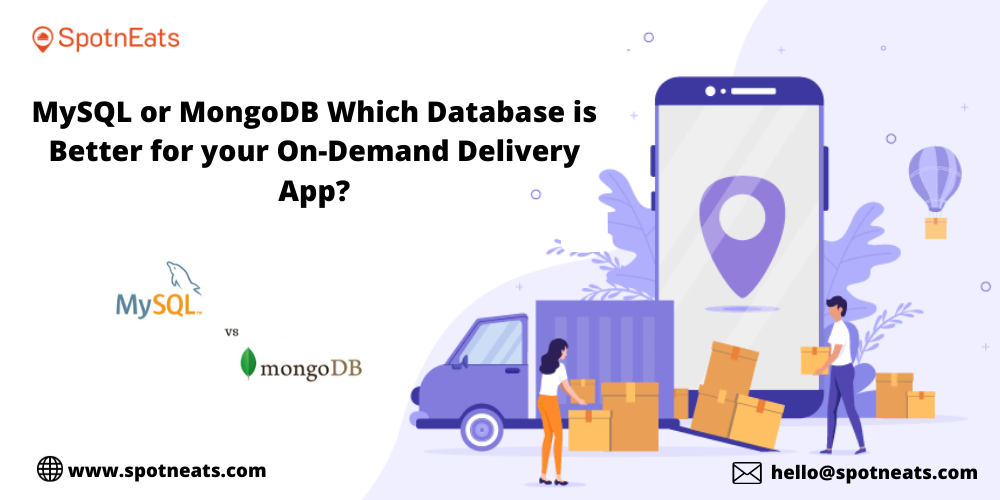
MySQL or MongoDB Which Database is Better for your On-Demand Delivery App?
On-demand delivery apps like food delivery and courier delivery are so delicately built since it establishes the prime connection between the service provider and the user. Any performance issue in the app will surely place it in a detrimental position. There are few factors that influence the performance of the app, they are database, app architecture, and design.
The database is very vital among all. On-demand delivery startups often expand in a short period of time and to accommodate this rapid scaling, the food delivery app database must be resilient and flexible.
We as a maker of the on-demand delivery app SpotnEats have good expertise in multiple database frameworks. Yet, MySQL and MongoDB are predominantly used and the reason for it is explained later.
MySQL and MongoDB are relational and non-relational databases respectively. MongoDB is the latest of the two still both are so close that it is difficult to choose between two.

How to Choose the Right Database for On-Demand Delivery App Development?
MySQL
Now let us talk a little about MySQL. Twitter, Youtube, Netflix are some top apps that use MySQL. While making any changes in the schema, the migration procedure in framework selection and backend development is necessary which may affect the performance of the app.
MongoDB
MongoDB’s application data can naturally map objects in the application mode itself. This facilitates the developers to easily handle and maintain MongoDB database. Also, MongoDB comes with the option of enhancing its scalability in a hassle free manner.
From this, we cannot completely conclude that MongoDB is better than MySQL.
We will see how both the database management system fares on some parameters that are crucial to on-demand app solution success.
Speed and performance
MySQL uses multiple tables to store data and its efficiency reduces when a large amount of data is to be handled. MongoDB on the other side can handle very large volumes of data. MongoDB stores data in a single entity and any edits can be performed in a single place.
Obviously, the speed and performance while handling large data is better in MongoDB.
Here, we can breakdown the on-demand app solution into two areas. MySQL for small on-demand delivery startups and MongoDB for multi-region online restaurant marketplace.
Restaurant which need a standalone food ordering apps can comfortable opt for MySQL.
Complexity of the app solution
Complex on-demand apps are like food ordering app solutions along with restaurant management that involves complex transactions. It is better to be away from MongoDB for complex applications.
MySQL is a mature solution with the flexibility of open source. Somecomplex on-demand apps have unstructured data and MySQL handles such data better. Also, debugging and upgrades are easy and give a perfect end-user experience.
Get your Free Demo: Whatsapp | Skype
Security
Ecommerce and on-demand involves a lot of money transaction and user data. So security is crucial and data compromise is frowned upon. MySQL is known for its data security features. Popular payment systems and web apps prefer MySQL for their reliability and secure nature.
Each data stored in the tables are password protected with double encryption. This is not to say that MongoDB is less secure. Since it is relatively new it takes some time to gauge it for advanced security.
Cost of maintenance and operation
Like I said before, the cost of maintaining a database in MySQL is significantly lower than its peers. Its low cost of maintenance makes it attractive for small on-demand startups and bootstrapping startups.
On the other hand, if most of your data is accessed from the cloud, then there cannot be a better choice than MongoDB. MongoDB aligns well with the agility offered by cloud computing. Here, the cost is low.
Which is better? MySQL or MongoDB?
Obviously, there is not a conclusive answer for it since it heavily relies on the type of on-demand app, its scalability, mode of usage, functionality, etc.
Still, we give some recommendations based on our experience with varied clients.
Use MySQL if
- You have less capital and started small with fixed transactions.
- Data security is your preference with quality long-lasting service.
- Easy to moderate maintenance without frequent updates
- For mobile app back-end.
Use MongoDB
- On-demand app involving very large volumes of data with simple transactions. The standalone restaurant online food delivery system will be the best choice.
- Cloud-based data storage for all app interfaces
- Very high-performance app without any delay in data retrieval
Final say!
What we can conclude is that both MySQL and MongoDB are good at serving a particular area. Whatsoever, if you have the slightest idea of starting an on-demand delivery startup, you join with us to get SpotnEats. We will guide you to selecting the right database system.
Get your Free Demo: Whatsapp | Skype
Our web and mobile app team is well versed in multiple databases. To know more details about SpotnEats, kindly tap a message to [email protected].
Comments are closed.
